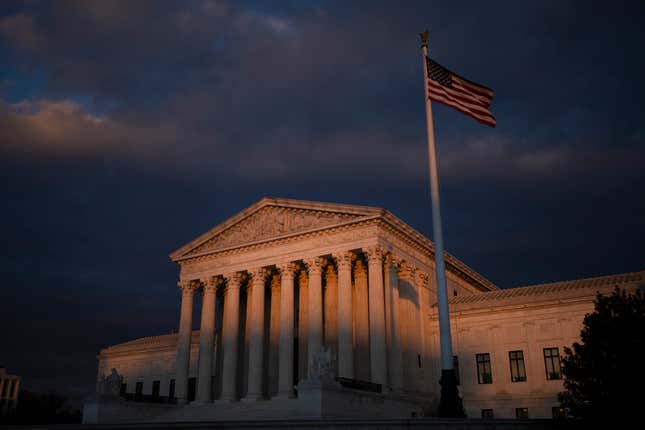Live Blog: Supreme Court Takes Up Abortion Case That Could Overturn Roe
Oral arguments begin Wednesday in Dobbs v. Jackson Women's Health Organization, which could end abortion rights as we know them.
AbortionPolitics

The conservative-packed Supreme Court will hear arguments in the most consequential abortion case in decades this morning. At the heart of Dobbs v. Jackson Women’s Health Organization is a 15-week abortion ban passed by the state of Mississippi in March 2018. But because of the machinations of the Supreme Court, the arguments are challenging the legality of abortion as we all know it.
The justices do not like being painted into a box with only either-or choices, but that is exactly what the state of Mississippi has asked these nine lawyers to consider. The question at hand is “whether all pre-viability prohibitions on elective abortions are unconstitutional.” (Chief Justice John Roberts wrote in an opinion in June 2020 that he sided with abortion precedents because he wasn’t being explicitly asked to rule on the “constitutional validity” of abortion laws. It all has a real you made this bed, sir energy to it.)
The Center for Reproductive Rights’s Julie Rikelman will argue for Jackson Women’s Health Organization, the last abortion clinic in Mississippi, and U.S. Solicitor General Elizabeth Prelogar will represent the U.S. government. Scott Stewart, the state solicitor general, will defend Mississippi’s abortion ban.
Lingering in the air of the building etched with “Equal Justice Under Law” is last month’s arguments for S.B. 8, the six-week abortion ban in Texas. It’s been more than 80 days since the cruel law went into effect, sending abortion patients out of state in droves. Between the arguments in Dobbs and S.B. 8, abortion clinics are in a holding pattern, bursting at the seams with too many patients for too few appointment slots, wondering if trigger bans (laws written to outlaw abortion if Roe v. Wade falls) will go into place.
-

-

-

-

-

-

-

-

-

-

-

-

-

-

-

-

-

-

-

-

-

-

-

-

-

-

-

-

-

-

-

-

-

-

-

-

-

-

-

-








































